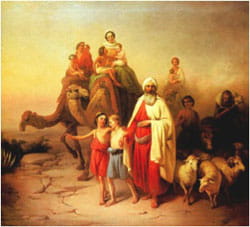By Talia Davis
 The parsha (weekly Torah portion) for this week is Lech Lecha. Lech Lecha means ‘go' or ‘leave' and they are the fifth and sixth words (but first distinctive words) in the portion. Be sure to check out the video at the end of this article!
The parsha (weekly Torah portion) for this week is Lech Lecha. Lech Lecha means ‘go' or ‘leave' and they are the fifth and sixth words (but first distinctive words) in the portion. Be sure to check out the video at the end of this article!
In this week's parsha, we have G-d giving this land, the land of Israel, again to the Jews through Abram (or Avram . . . he is not AbraHam yet). However, there is a famine in this land. It was a localized famine and so Abram decided to travel south to Egypt because there was no famine there. Abram knows the kind of people who live in Egypt and he is wary. He is concerned because his wife Sarai (again, she is not yet SaraH) was very beautiful and if a Pharaoh wanted a man's wife, he would just kill the man and take the woman. So Abram tells Sarai to act as if she is his sister. Not only that but he was hoping to capitalize on her beauty and get extra goods.
So Abram and Sarai went to Egypt and just like Abram suspected, the Pharaoh became enamored of Sarai and wanted her. So Pharaoh gave Abram cows and donkeys and camels and servants . . . all in an attempt to get Abram to give Pharaoh his "sister." G-d saw this and was not thrilled, so G-d sent plagues down on Pharaoh. Pharaoh was furious. He went to Abram and said, "Look, why didn't you just tell me she was your wife? Why did you trick me and let me take her?" Pharaoh tells them to get out of town and quickly. He was impressed by the plagues but he couldn't ensure that Sarai wouldn't attract more attention and Abram might be killed. The Pharaoh had his men escort them and their "stuff" out of town.
Abram and Sarai came out of Egypt with Abram's nephew, Lot. They had silver and gold and livestock with them. They travelled back to the first location they had settled in, where Abram had built an altar to G-d. Now, Abram has a lot of ‘stuff' and so does Lot. They keep rubbing elbows. There was not enough room for their cattle to graze and there were some fights between their cattle handlers. So Abram tells Lot, look, see all this land? Pick anywhere you want to go and I will go in the other place. Lot picks this lovely place a bit to the south. It's a valley that has a lot of water. The area would become known as Sodom and Gomorrah, and even later known as the Dead Sea. In addition to that area, he chooses much of Jordan. So Abram lived in Canaan (Israel) and Lot lived on the plains of Jordan for a bit and then pitched his tents in Sodom. There was a hitch. The folks living in Sodom weren't quite the nicest people out there. In fact, they were pretty evil and sinful.
Here, G-d has a chat with Abram. G-d tells Abram to look all around, north, south, east, and west. All the land you can see, I am giving to you and your children for eternity. Your seed will be like dust on the earth so that if a man were able to count the dust, then could your seed/children be counted. Then G-d tells Abe to get up and walk the length and breadth of the land (a command that many modern sons and daughters of Abram are fulfilling today). At that point, Abram was living in Hebron.
This next part isn't an easy read, especially without a map, so we will summarize. Led by Chedorloemer, the king of Elam, four kings waged war against five other kings. (For those of you playing the home game, the kingdoms were Shinar, Ellasar, Elam, and Goyim [a kingdom of many nations] vs. Sodom, Gomorrah, Admah, Zeboiim, and Bela [which is in Zoar].) These guys all got together in the valley of Siddim (which is where the Dead Sea is now) and for twelve years, they served Chedorloemer. Then for thirteen years, they rebelled against him and in the fourteenth year of that rebellion, Ched ‘smote' four more kingdoms. Then they came back to another locale, Ein Mishpat, and killed a field of Amalekites and Amorites. This guy wasn't playing around. The five kings we mentioned before weren't thrilled so they fought them again. They didn't succeed and then the kings of Sodom and Gomorrah ran away to hide in the mountains. (This section is going to become clear now . . .) The conquerors happily took all the stuff of the people of Sodom and Gomorrah along with the people who remained as slaves. This included Lot.
Og was the only survivor and he ran to Abram to tell him that these people had taken his family members captive, so Abram rounded up his men (about 318 of them) and went after them. Even though he didn't have many men, he attacked and beat the nasty kings. He took restored the people's possessions and made sure Lot was safe. After this, the king of Sodom went to thank Abram and the king of Salem brought some bread and wine out. With these, they blessed Abram and then G-d. The king of Sodom was thankful but he knew that he didn't really have the rights to the ‘stuff' anymore since Abram won it in battle. All he asked for was the people. Abram refused and says something interesting here. He won't take anything that he ‘captured' and won't accept any gifts. Why not, he just did something amazing! He won't take it because he doesn't want anyone to say that is was Sodom who made him wealthy. He gave his servants the chance to take what they wanted but he did not take.





